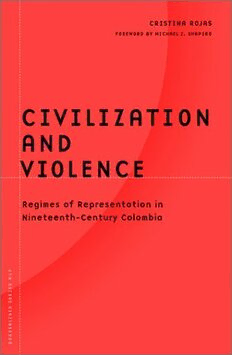
Civilization And Violence: Regimes of Representation in Nineteenth-Century Colombia (Borderlines series) PDF
256 Pages·2001·1.433 MB·English
Most books are stored in the elastic cloud where traffic is expensive. For this reason, we have a limit on daily download.
Preview Civilization And Violence: Regimes of Representation in Nineteenth-Century Colombia (Borderlines series)
Description:
Civilization and violence are not necessarily the antagonists we presume-with civilization taming violence, and violence unmaking civilization. Focusing on postindependence Colombia, this book brings to light the ways in which violence and civilization actually intertwined and reinforced each other in the development of postcolonial capitalism. The narratives of civilization and violence, Cristina Rojas contends, play key roles in the formation of racial, gender, and class identities; they also provide pivotal logic to both the formation of the nation and the processes of capitalist development. During the Liberal era of Colombian history (1849-1878), a dominant Creole elite enforced a "will to civilization" that sought to create a new world in its own image. Rojas explores different arenas in which this pursuit meant the violent imposition of white, liberal, laissez-faire capitalism. Drawing on a wide range of social theory, Rojas develops a new way of understanding the relationship between violence and the formation of national identity-not just in the history of Colombia, but also in the broader narratives of civilization. Cristina Rojas teaches Latin American politics and international political economy at the Norman Paterson School of International Affairs at Carleton University in Ottawa. Borderlines Series, volume 19
See more
The list of books you might like
Most books are stored in the elastic cloud where traffic is expensive. For this reason, we have a limit on daily download.
